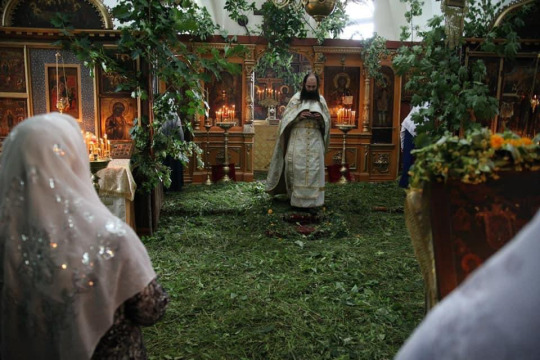Note
Hi, I've messaged you before as @ramaum and I'm on an alt. I was wondering if it wouldn't be too much to ask what appealed to you about Orthodoxy rather than the RCC? Especially concerning to me is their withholding of the cup from communicants and their strange doctrines of purgatory. I was just wondering why one would go through the inconvenience of becoming Orthodox rather than just going to a nice, normal old Catholic church?
The big thing has always been the Papacy.
At the time, I remember the big thing came from Tim O'Neill, an atheist with a Masters in History who has devoted his internet presence to debunking atheist myths (think "the Catholic Church executed scientists" or "the ancient Greeks were rational freethinkers until Christianity came along") via his blog History for Atheists. However, the relevant bit comes from his earlier blog, History Versus the Da Vinci Code, where he writes this:
"In Constantine's time there actually was no single 'Church' at all, let alone one that was 'Roman'. Christianity, at this time, consisted of a loose collection of church communities, each headed by their bishop, archbishop or patriarch and, as the dispute which led to the Council of Nicaea shows, these communities were far from united. The Bishop of Rome, whose successors were to become the popes of later centuries, claimed a certain authority as successors of Saint Peter, but he was seen as no more prestigious in rank as the other great patriarchs: the bishops of Jerusalem, Antioch, Alexandria and Constantinople. It was only centuries later, when Alexandria, Antioch and Jerusalem had fallen to the Muslims and Constantinople and Rome separated over doctrine, that the Popes began to claim 'primacy' over other bishops. To talk about a 'Roman Catholic Church' in the Fourth Century is ridiculous." (emphases added)
I think you can see how that aligns with Orthodox views of ecclesiology and Church history.
The big objection now is two points.
Firstly, I think that the papacy is actually very similar to sola scriptura - both are claims that a singular thing is the standard by which everything else in Christianity is to be evaluated. Whereas under the Orthodox view, only the Holy Trinity should be the universal standard of evaluation, rather than anything on earth, because They can work through all things and are confined by nothing. I write more about how that works in practice here and here.
Secondly, I think the papacy and sola scriptura are very similar in how their adherents (fail to) argue for them. Sola scriptura proponents will often cite passages from Holy Scripture or the Church Fathers which speak highly of Holy Scripture, cite it as authoritative or credit it with a unique authority. But none of that proves sola scriptura, because sola scriptura is the claim that Holy Scripture is the standard by which everything else is judged, which is significantly more expansive than saying that it's authoritative or even that it's uniquely authoritative. Likewise, papacy advocates will often cite passages from Holy Scripture or the Church Fathers which speak highly of St. Peter and/or the See of Rome, cite them as authoritative or credit them with a unique authority. But none of that proves the papacy, because the papacy is the claim that the See of Rome is the standard by which everything else is judged, which is significantly more expansive than saying that it's authoritative or even that it's uniquely authoritative.
8 notes
·
View notes
Text
How Authority Works in the Orthodox Church
In a DM conversation, @thatgentlewife asked me how authority works on Orthodoxy; however, I don't think I explained it very well, so I'm making this post to explain.
The principle test is reception into Tradition. That is, a thing is authoritative if it becomes part of the body of things believed and practiced by the Orthodox Church, over and against opposite beliefs. For example, Protestants use the Masoretic Text (the primary Hebrew manuscript tradition of the Old Testament), whereas we use the Septuagint (the Greek Old Testament tradition), because that was the one used by the Apostles and early Christians. Protestants consider the Masoretic Text more authentic due to being older (which is a somewhat dubious claim; will elaborate for anyone interested), but since it did not enter Christian Tradition in the same way we prefer the Septuagint.
As to how this works with Church councils, a good example is the Iconoclast Controversy. The Iconoclasts, who opposed icons, held the Council of Hieria, while the Iconodules, who supported icons, held the Second Council of Nicaea. Both were around the same time and had similar numbers of bishops - indeed, some Calvinist Protestants regard Hieria as the true council due to having more bishops and being earlier - so why do we side with Second Nicaea? Because, when the dust had settled, the majority of Orthodox Christians chose Second Nicaea, and it continues that way to this day.
There's an obvious problem: how to distinguish between capital-T Tradition (which is authoritative) and small-t tradition (which is not authoritative and may even be bad)? I'll put in a few case studies below:
Vampires: It's pretty well known that belief in vampires was historically common in Eastern Europe (although the traditional conception of vampires was closer to a blood-drinking zombie than our idea of a vampire), where most Orthodox Christians are. So are vampires part of Orthodox theology? No. For starters, vampire belief was also common among Catholics, Muslims and Jews in Eastern Europe, and was distinctly uncommon among Orthodox Christians in the Middle East (such as those in Syria and Palestine). Hence, it was an Eastern European rather than an Orthodox belief, and so, whether or not vampires are real, Orthodox Christians are under no obligation to believe in them.
Kourbania: Kourbania was a practice in the Greek world where people would offer animal sacrifices to saints, which in some places continued for centuries. However, numerous monastics and bishops condemned the practice as paganism and idolatry, which in itself is strong evidence of being a tradition and not part of Tradition, but the nail in the coffin is that it was never practiced outside of the Greek-speaking world, and thus isn't part of Orthodox Tradition (which ranges far beyond Greece).
The Lord's Prayer: While the Lord's Prayer is obviously a part of Orthodox practice, a big part of why it's so important (recited in almost every church service and as part of both morning and evening prayers) is a combination of being extremely widespread (due to being instituted by Christ Himself) and ritualised recitations of it being extremely old (the Didache, a church manual written in the late 1st century, tells Christians to pray the Lord's Prayer three times a day).
9 notes
·
View notes
Text
"Yet a Christian has need of none of these [works] for justification and salvation, but in all his works he ought to entertain this view and look only to this object—that he may serve and be useful to others in all that he does; having nothing before his eyes but the necessities and the advantage of his neighbour. Here is the truly Christian life, here is faith really working by love, when a man applies himself with joy and love to the works of that freest servitude in which he serves others voluntarily and for nought, himself abundantly satisfied in the fulness and riches of his own faith."
Martin Luther, Concerning Christian Liberty
19 notes
·
View notes
Text
Let us now in this time of war, pray for peace.
God of peace, your prophet Isaiah promised swords would be turned into ploughshares,
and your Son’s mother, Mary, proclaimed the mighty would be put down and the humble exalted:
visit the people of Palestine, Iran, Sudan, Ukraine, Myanmar, and every place where bombs fall ; deliver them from fear, violence, attack, injury, destruction, death;
and give them courage, solidarity and allies in their hour of vulnerability and sorrow.
Turn the hearts of those bent on war and invasion. Let guns fall quiet and missles not fly.
Strengthen the hand of all seeking to halt conflict, restore order, and pursue justice.
And make this moment of peril an occasion for your Holy Spirit to show your world the cost of conflict and our dependence on one another.
In Christ our Lord, who went to his death because of our hatred, and rose again because our hatred is never stronger than your indomitable love.
Amen.
56 notes
·
View notes
Note
So what do you make of Quaker worship?
Meditative and apophatic.
It almost posits that God's essence is beyond human comprehension and cannot be fully captured by human language or concepts.
In short I think it's pretty cool 🙂
30 notes
·
View notes
Note
I agree, I’m in love with Quakerism ngl.
Do you think the absence of the Eucharist invalidates it as worship? Perhaps it is fellowship (and prayer of course), but could it be considered worship in your view?
So what do you make of Quaker worship?
Meditative and apophatic.
It almost posits that God's essence is beyond human comprehension and cannot be fully captured by human language or concepts.
In short I think it's pretty cool 🙂
30 notes
·
View notes
Text
In our struggle for prayer the emotions are almost irrelevant; what we must bring to God is a complete, firm determination to be faithful to Him and strive that God should live in us. We must remember that the fruits of prayer are not this or that emotional state, but a deep change in the whole of our personality. What we aim at is to be made able to stand before God and to concentrate on His presence, all our needs being directed Godwards, and to be given power, strength, anything we need that the will of God may be fulfilled in us. That the will of God should be fulfilled in us is the only aim of prayer, and it is also the criterion of right prayer. It is not the mystical feeling we may have, or our emotions that make good praying.
Living Prayer by Anthony Bloom
26 notes
·
View notes
Text
Let’s talk about the long and often overlooked history of Christian protest — because it didn’t start in the 1960s, and it definitely didn’t end there either.
It begins with Jesus.
Jesus didn’t just preach love—he practiced resistance. Not passive submission, but a deep, active nonviolence that challenged empire, religious hypocrisy, and social injustice.
He refused to meet violence with violence.
He flipped tables, not people.
He told his followers to turn the other cheek—not out of weakness, but as a form of nonviolent confrontation that exposed injustice.
When facing Pilate, he said: “My kingdom is not of this world”—a political statement rejecting the authority of empire, while refusing to stoop to its tools.
158 notes
·
View notes
Text
today, june 15th is the feast day of author, pacifist, and mystical theologian evelyn underhill (6 december 1875 - 15 june 1941). as well as her many literary contributions which include poetry, novels, translations, and biographies, she was the first laywoman to lead retreats in the anglican church (x)
The spiritual life is not a special career, involving abstraction from the world of things. It is a part of every man's life; and until he has realised it he is not a complete human being, has not entered into possession of all his powers. It is therefore the function of a practical mysticism to increase, not diminish, the total efficiency, the wisdom and steadfastness, of those who try to practise it. It will help them to enter, more completely than ever before, into the life of the group to which they belong. It will teach them to see the world in a truer proportion, discerning eternal beauty beyond and beneath apparent ruthlessness. It will educate them in a charity free from all taint of sentimentalism; it will confer on them an unconquerable hope; and assure them that still, even in the hour of greatest desolation, "There lives the dearest freshness deep down things."
- Practical Mysticism (1914)

some of her works:
Ruysbroeck (1915)
The Mystic Way: A Psychological Study in Christian Origins (1914)
Immanence (1912)
Mysticism: A Study in Nature and Development of Spiritual Consciousness (1911)
22 notes
·
View notes
Text
I’m so tired and so scared all the time of everything going on. You know what makes me suicidal? The idea of living to see a world war happen and things go out of control and people I love be killed. It’s pathetic but true. I’m terrified.
43 notes
·
View notes
Text
Is your way of life in keeping with the teaching of Jesus? Do you watch against conformity to commonly-accepted standards, and against the love of ease and self-indulgence which hinders your spiritual growth and service for Christ?
Queries for Serious Consideration, Ireland Yearly Meeting
16 notes
·
View notes
Text
It comes the very moment you wake up each morning. All your wishes and hopes for the day rush at you like wild animals. And the first job each morning consists simply in shoving them all back; in listening to that other voice, taking that other point of view, letting that other larger, stronger, quieter life come flowing in. And so on, all day. Standing back from all your natural fussings and frettings; coming in out of the wind.
C.S. Lewis, from Mere Christianity (Tingle Books, May 17 2024) (via The Hammock Papers)
77 notes
·
View notes
Text



Orthodox Church decorations during the feast of Pentecost
290 notes
·
View notes
Text
"We say, therefore, that consent to cohabitation or carnal intercourse does not make marriage, but consent to conjugal friendship... as when a man says, "I take you as mine," not as my master, not as my slave, but as my wife.
"Why was woman formed from the side of man?
"Because, indeed, she is not given as slave or master, and so she was not formed in the beginning from the highest or the lowest part, but from the side of man, on account of conjugal friendship. If she had come from the highest part (the head), it would have seemed that she was created to dominate; but if from the lowest (the feet), it would have seemed that she was to be subjected to servitude. But because she is taken neither as master nor as slave, she came to be from the middle, that is, from the side, because she is taken for conjugal friendship."
Peter Lombard, Sentences, IV dist. 28 c. 3.2-4.1
163 notes
·
View notes





